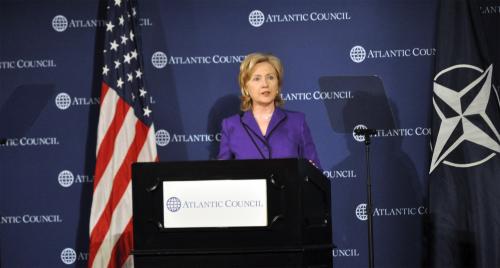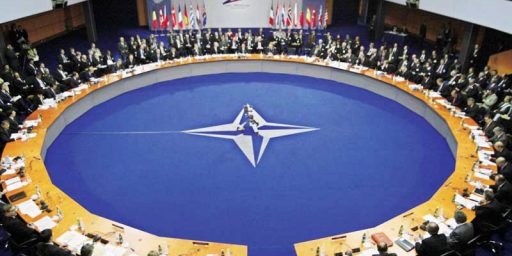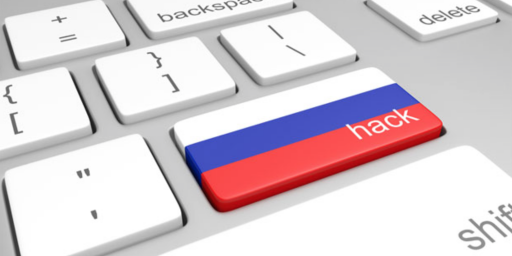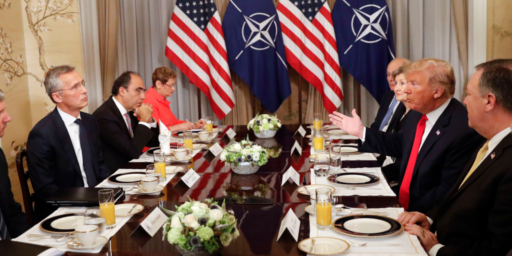Hillary Clinton on NATO’s Future
 Secretary of State Hillary Clinton gave a speech on the future of NATO to the Atlantic Council last night, kicking off the Washington Strategic Concept Seminar.
Secretary of State Hillary Clinton gave a speech on the future of NATO to the Atlantic Council last night, kicking off the Washington Strategic Concept Seminar.
More often than not, when sitting officials give public speeches, they tend to be incredibly bland, containing little fodder for those of us engaged in the subject matter on a daily basis. On this subject in particular, it’s especially likely — let alone when the audience includes the NATO Secretary General and dozens of ministers and high ranking military officers from around the world.
I was pleasantly surprised. While I’m not sure she broke any real news, she articulated the Obama administration’s thoughts on the transatlantic relationship and the evolving international security arena quite thoughtfully. For the most part, the changes are subtle and continue a steady and bipartisan evolution that’s been taking place for going on twenty years.
In a series of postings at New Atlanticist, I summarize and critique what I thought to be the four most salient issues in the address.
Clinton on Russia and NATO - Clinton worked very hard to square the circle on NATO-Russia relations, both advocating increased cooperation and leaving the door open for further contentious expansion. At the end of the day, however, I predict that “the right of countries to join the Alliance regardless of Moscow’s wishes will remain a matter of theory rather than practice. And that desires for ‘a cooperative relationship’ will continue to trump expansion.”
Clinton: Cyber Security and Energy Security as NATO Priorities – The secretary argued that “threats to our networks and infrastructure such as cyber attacks and energy disruptions” should be considered an Article V action, in which an attack on one is an attack on all. She’s right up to a point. But I contend we should “continue to be miserly in invoking Article V, reserving it for only the most serious threats to the Alliance.”
Clinton: EU No Threat to NATO – The United States has completed a long journey and has finally come to realize that “ESDP isn’t a competitor to NATO. Indeed, the problem isn’t that the Europeans are robustly engaging in military operations without us but that they’re mostly underfunding their defense forces and reluctant to participate even in missions they’ve agreed to join.”
Clinton: NATO Reform Needed – Here, we’re in complete agreement. NATO’s institutions are a relic of a bygone age and need major overhaul.






I’m actually more interested in how the Obama Administration’s actions are related to its rhetoric. Aspirations are all well and good but in the final analysis it’s what you do that’s important rather than what you’d like to think you’d do.
J-Dawg- Did Lady C. talk about climate change, the Copenhagen Protocol, etc in the North Atlantic context? There is a push by people like John Warner to link climate change with national security. Given the US-EU rift on climate, it would be interesting to see if that topic penetrated Hilzilla’s consciousness.
Also, do you geezers webcast the speeches?
Nope. The only mention of the C-word came from Maddy Albright as introducer, and even that was just in passing and not related to NATO or security.
So if I understand correctly, she’s saying that when much of Europe’s natural gas supply was cutoff last year during the squabble between Russian and Ukraine over payments, the US should have interpretted this as Russia launching a military attach on Europe and responded accordingly?
I think that’s the danger of saying it’s an Article 5 action. She’s not saying that at all but it’s the connotation of Article 5.
If I can split some hairs, I think that is exactly what she’s saying, although it’s not what she meant.
This is spelled out in the linked post in some detail. But Art 5 isn’t just military responses according to the letter of the treaty. But….
While Article 5 doesn’t deal only with military responses, it does deal solely with responses to a military attack.
True.